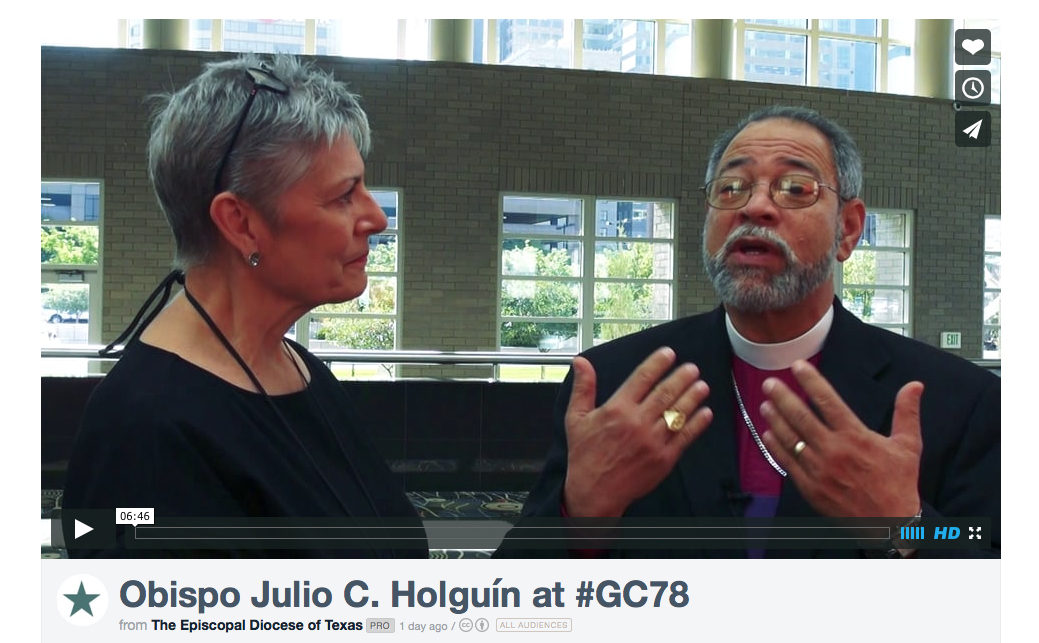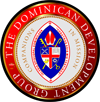Bishop Holguīn Interviewed at General Convention
By Julius Ariail
Posted June 30, 2015

Bishop Holguín speaking about the Dominican diocese and the current Haitian residency situation. To access this video, click this image.
Carol E. Barnwell, Director of Communications for the Diocese of Texas, interviewed the Rt. Rev. Julio C. Holguín, Bishop of the Diocese of the Dominican Republic, during the 78th General Convention of The Episcopal Church in Salt Lake City, Utah. Bishop Holguín was asked to comment on the Dominican Diocese, the current Haitian residency situation, and his impression of the General Convention. To access this video, click the image above or the link below:
During the interview, Bishop Holguín mentions that the Dominican diocese has a committee that is helping undocumented Haitians living in the Dominican Republic to obtain legal residency documents. Contributions to assist in this work may be sent to the Dominican Development Group at the address below for secure transmission to the Diocese of the Dominican Republic. These contributions are tax-deductible as a charitable contribution. Contributions for this purpose may also be made on the “Donate” page of the DDG’s website, here: http://dominicandevelopmentgroup.org/donate/
Dominican Development Group
PO Box 272261
Tampa FL 33688-2261 USA
Please note “Haitian Residency Assistance” on your check or in the notes section of the online donation form.
A English transcript of the interview is below:
The Episcopal Diocese of Texas
Carol E. Barnwell, Director of Communications (DC)
Bishop Julio Holguín (BH)
DC: We are here with Bishop Julio Holguín from the Dominican Republic and we are going to ask him just a few questions about the Church in his Diocese.
Bishop, can you tell us something about the Diocese in the Dominican Republic?
BH: Thank you, it’s a pleasure! The Church in the Dominican Republic is a dynamic vibrant church. It was stablished in 1897 and today we are in a growing and expansion process of evangelization, social work, and social commitment.
DC: What’s your vision for the Church there?
BH: Well, the vision of the Church is to assume with responsibility the Great Commission, that it would be a self-sustaining church and that it may have a greatly committed lay and clerical leadership willing to proclaim the Gospel and to serve the needy.
DC: Yes, today, there is a problem right? How is the Episcopal Church responding to the expulsion of people of Haitian descent?
BH: Well yes, since 1983 we have sustained a special program called “Pastoral Care of Haitian People”, now “Pastoral Care of Immigrants”. Moreover, as a church we have been working with other organizations of the civil society seeking the defense of the rights, not only of illegal immigrants, but also of their descendants, the sons of those people whose nationality has been denied. Thanks to God and to the joint effort with those organizations, we have achieved the recognition by the Dominican Government of the legal documents as Dominicans of at least 55,000 people born in the country.
DC: Are there many of this people in your church?
BH: Yes we have, particularly around the sugar industry zone called the “bateyes”. But also in urban locations we have members in local churches.
DC: Anything else you want to say?
BH: Well, I think that one of the things every Christian must keep in mind, every believer I would say, is that the Word of God himself teaches us that we must welcome the stranger. Our Lord Jesus Christ in St. Mathew’s Gospel states it clearly in chapter 25 when he says: “I was a stranger and you welcomed me” and something we have to learn and practice is to see ourselves in the other’s face, welcome the other, and never under any circumstance practice something as negative as discrimination.
DC: Very good. How could the Church here help you?
BH: Well, we in the Dominican Republic have tried to help these people collect information and documents, sometimes that takes some money since they do not have anything. Therefore, we need to have a fund to provide legal resources and lawyers and for us to help them look for documents.
Any help that we might receive on that matter will be welcomed. It would make it easier for families and people to have their documents and live peacefully in the Dominican Republic, because not having documents creates the fear of being incarcerated and sent to Haiti.
Many Haitians voluntarily have decided to leave. Let us say that approximately 15,000 people or more have already left the country to the Haitian side, afraid of being taken by force and sent to Haiti without even taking their properties with them or leaving their children behind and the family broken.
DC: How’s the General Convention going for you?
BH: Well, it is a Convention that is going well. We have had the election of the Primate Michael Curry, and we have many hopes that his leadership in the Church will maintain the vision of mission that it needs, particularly evangelization mostly focused to new generations. Because we know that not only in first world countries but also in the third world countries, young people are distracted by other things. Let’s put it this way, the Church has disregarded its role of attracting young people and having programs attractive to them so that they can be evangelized and catechized. In addition, I have the hope that the new primate bishop Michael Curry is going to put this into his priorities.
DC: Very good, thank you for talking to us.
BH: It’s a pleasure, many blessings and greetings!
DC: Thank you.
